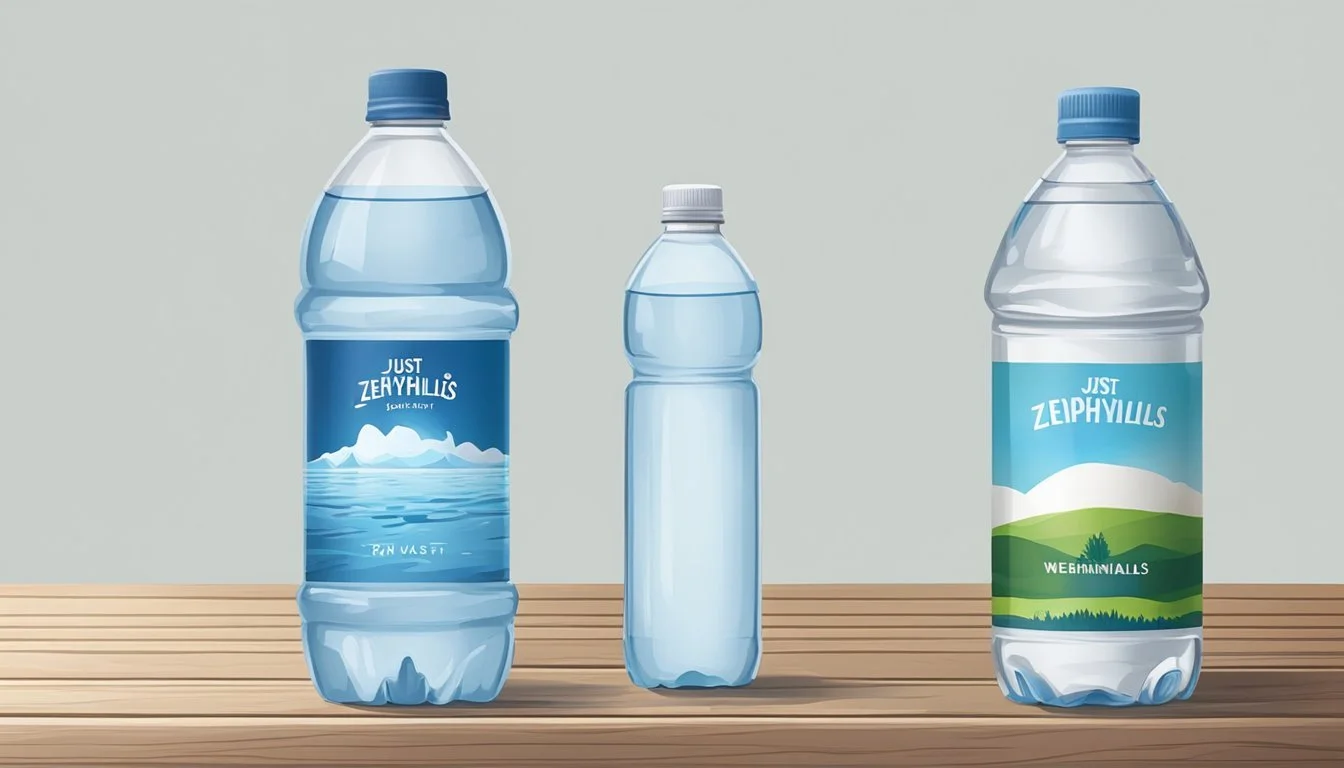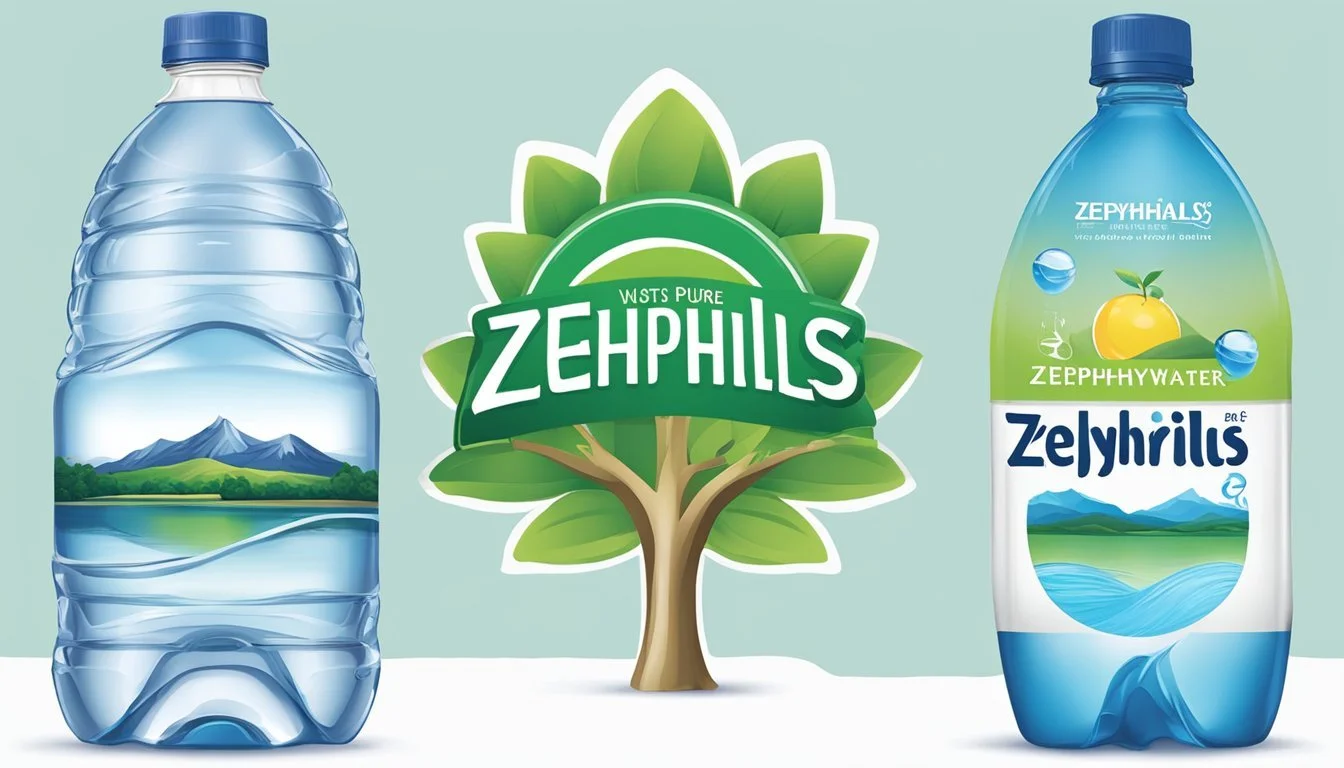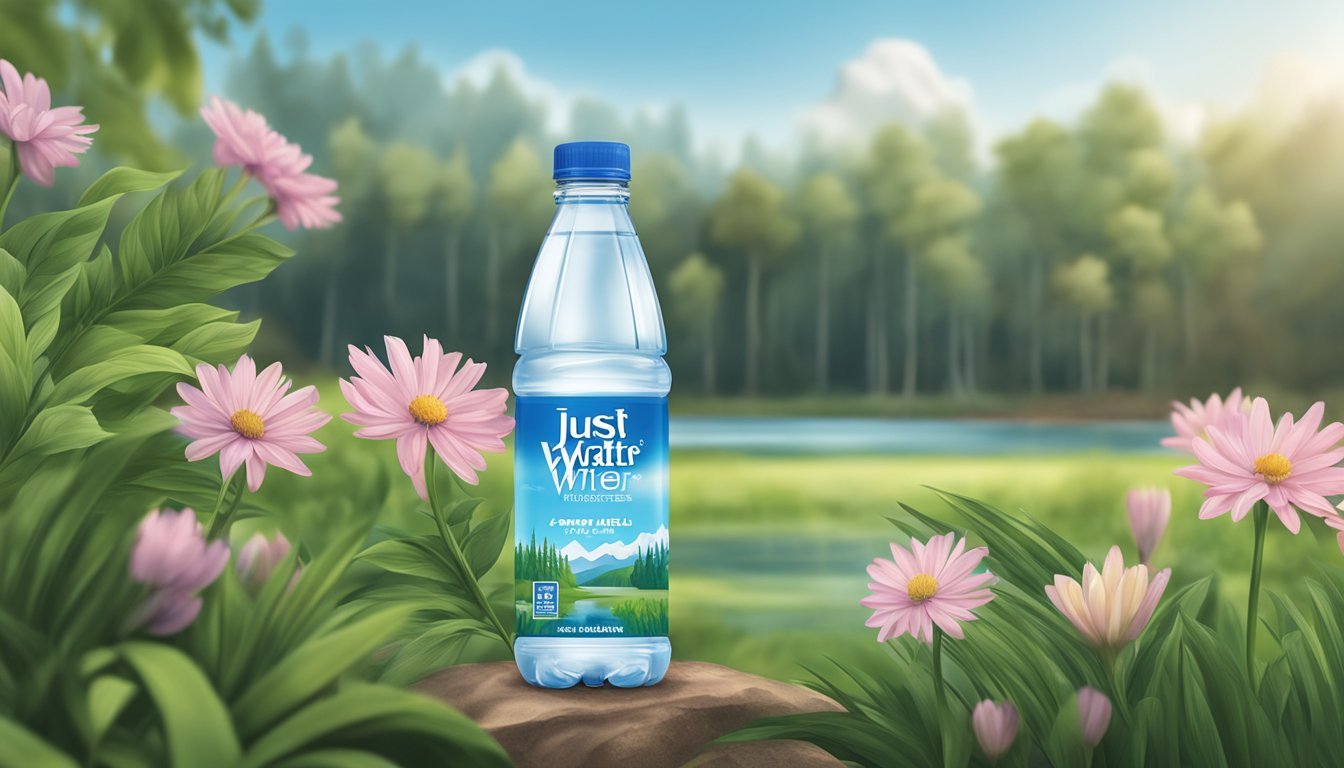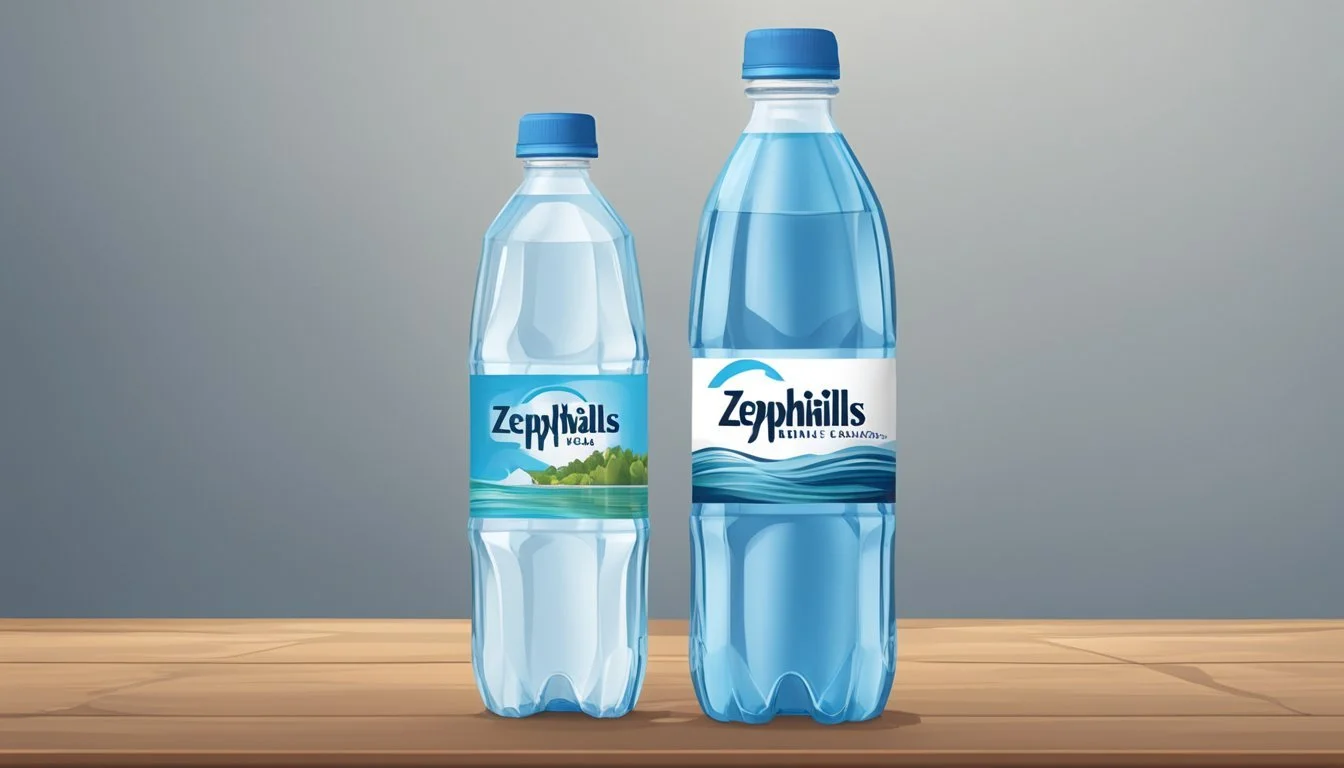Just Water vs. Zephyrhills
A Comprehensive Comparison of Bottled Water Brands
The bottled water industry has seen a significant surge in popularity and diversity, with numerous brands catering to a wide array of preferences and values. Among these brands, Just Water and Zephyrhills stand out for their unique selling propositions. Just Water touts its eco-friendly packaging and ethical sourcing, emphasizing sustainability and environmental responsibility in its branding. Zephyrhills, on the other hand, is known for sourcing its water from Floridian springs, offering a taste that is distinctive to its regional heritage.
Consumers often grapple with the choice between these two brands, each promising a refreshing experience but with different appeals. Just Water's carton-based packaging, made predominantly from paper, represents an effort to reduce plastic waste. The company claims that its water is responsibly sourced from a watershed in upstate New York, ensuring a minimal environmental impact. Zephyrhills, a brand that has been around for decades, delivers natural spring water that many consumers trust for its quality and consistency.
These factors contribute to the ongoing debate about which bottled water is superior. While both Just Water and Zephyrhills maintain their adherence to safety and quality standards, they cater to different consumer values: sustainability and environmental impact versus regional sourcing and taste. Their bottled waters not only quench thirst but also reflect personal choices and lifestyles, leading to a decision that goes beyond mere hydration.
Overview of Bottled Water Industry
The bottled water industry has burgeoned into a significant market segment within the beverage sector. High consumer demand is driven by health concerns regarding tap water and the convenience of portable, purified water. Global market growth has been consistent, with a projected compound annual growth rate (CAGR) of 5.9% from 2023 to 2030.
Leading brands, such as Nestlé's Zephyrhills and Just Water, strive to establish a distinctive presence in a crowded marketplace. They often compete on various factors, including purity, taste, and sustainability initiatives, to appeal to a discerning consumer base.
The industry’s dynamics are influenced by the International Bottled Water Association (IBWA), which provides guidance on standards for quality, labeling, and environmental responsibility. Companies are increasingly attentive to their environmental footprint, with efforts to reduce plastic usage and improve recycling practices.
Internationally, the industry encompasses a wide range of companies from massive conglomerates to local entities. The involvement of investment firms, such as One Rock Capital Partners and Metropoulos & Co., in the acquisition of water brands like Zephyrhills, indicates both the profitability and the dynamic nature of the market.
Consumers often base their bottled water choices on the unique qualities of different brands. For instance, Waiakea water touts its naturally alkaline properties and sustainable sourcing from a volcanic well, setting it apart from others in terms of both product characteristics and branding narrative.
Just Water and Zephyrhills Brand Profiles
Just Water
Just Water is a bottled water brand that prides itself on its eco-friendly packaging and ethical sourcing. Established with a strong environmental initiative, its bottles are made from 82% renewable resources, primarily composed of paper and sugarcane. Just Water sources its water from a spring in Glens Falls, New York, offering natural purity and a naturally high pH.
Packaging: 82% renewable resources
Source: Glens Falls, New York
pH: Naturally high
Zephyrhills
Zephyrhills is a brand of bottled spring water that is sourced from carefully selected springs in Florida. Owned by Nestlé, one of the largest food and beverage companies, Zephyrhills emphasizes the natural origin and refreshing taste of its product.
Owner: Nestlé
Source: Florida springs
Both brands are distinct in their identity and offerings. Just Water is recognized for its commitment to sustainability and eco-conscious practices, while Zephyrhills is known for its regional sourcing and belonging to an established beverage giant, Nestlé. Neither brand is affiliated with Coca-Cola; however, for context, Dasani is a purified water brand under the Coca-Cola Company, mentioned for comparative purposes in the consumer assessment of bottled water preferences.
Sources and Quality of Water
In comparing Just Water to Zephyrhills, it's essential to consider where each brand sources its water and the processes involved in ensuring its purity.
Spring Water Sources
Just Water prides itself on sourcing its water from a spring in the Adirondack Mountains, offering what they describe as naturally high-quality, mountain spring water. This source is designed to provide a sustainable yield of water that also supports the local ecosystem.
Zephyrhills, on the other hand, obtains its water from carefully selected Florida springs. It's natural groundwater that's managed to maintain a balance with the surrounding environment, a detail which can appeal to consumers concerned with the ecological impact of their purchases.
Purified Water Processes
The purification process for each brand goes beyond simple filtration. Just Water uses a proprietary filtration system known as Hydro-7™, which they claim reduces harmful contaminants more efficiently than standard methods. This indicates a commitment to both quality and public health.
Zephyrhills water is subject to a multi-step purification process. This includes micro-filtration, ozone disinfection, reverse osmosis, and UV treatment. These methods combined are intended to deliver water that is not just safe but also aligns with consumer expectations for taste and quality.
Compliance with FDA Regulations
Both Just Water and Zephyrhills assert full compliance with FDA regulations, which oversee the safety and labeling of bottled water. These regulations are enforced to protect public health, ensuring bottled water is safe to drink and free from contaminants.
The EPA sets standards for tap water, which apply to public water systems, while the FDA's standards for bottled water must be at least as stringent as the EPA's. This ensures that regardless of whether water comes from municipal supplies or natural water sources, safety is paramount.
Health and Safety Concerns
When choosing bottled water, health and safety are paramount. Both Just Water and Zephyrhills have been subjected to scrutiny regarding their respective water quality, addressing concerns about contaminants such as heavy metals, arsenic, lead, and BPA.
Just Water promises a natural alkaline pH, claiming their spring water is free from artificial additives. Their packaging is made from paper and sugarcane, contributing to reduced BPA exposure, a chemical commonly found in plastics that can affect health.
Zephyrhills, a brand known for its natural spring water, adheres to FDA requirements for safety. However, it is essential to note that their city council temporarily halted new developments over concerns it might deplete the water source.
Here are critical points concerning each brand and their approach to avoiding contaminants:
Just Water:
Emphasizes natural purity of their water source
Uses eco-friendly packaging to mitigate BPA risk
Regularly tests for heavy metals and arsenic
Zephyrhills:
Underwent testing, revealing the presence of PFAS chemicals, as noted in "Consumer Reports"
Complies with public health safety standards set by FDA
Monitors for lead and heavy metals in their water
Contaminants such as PFAS chemicals—often found in various consumer goods—pose a public health concern due to potential links to health issues over time. Both Just Water and Zephyrhills state that they conduct comprehensive testing to minimize such risks and ensure safe consumption for their customers.
Environmental Impact
In the evaluation of bottled water brands like Just Water and Zephyrhills, their environmental impact is critical, focusing on the eco-friendliness of their bottling processes and the effectiveness of their recycling and sustainability initiatives.
Bottling Processes
Just Water is known for its distinct carton-based bottle, which boasts a 82% plant-based construction. They employ a process that significantly reduces CO2 emissions when compared to traditional plastic bottles. The carton is made using paper from sustainably managed forests, and the cap is derived from sugarcane, offering a renewable aspect to its packaging.
Zephyrhills, on the other hand, utilizes conventional plastic water bottles. However, it's significant to note that Zephyrhills-branded water, owned by BlueTriton, has taken steps towards environmental considerations by adhering to responsible water sourcing and management practices to mitigate its impact on local water supplies.
Recycling and Sustainability Initiatives
Just Water takes pride in its push for sustainability, particularly through its emphasis on recyclable packaging. It encourages consumers to recycle its cartons, which can lead to reduced landfill waste. Moreover, Just Water is consistently exploring ways to improve the disinfection process and minimize its ecological footprint.
Zephyrhills has initiatives aimed at sustainability, primarily through promoting recycling of its plastic bottles. The company is part of larger corporate efforts to increase the use of recycled plastics in its bottles, as well as commitments to improve recycling rates among consumers. Additionally, Zephyrhills is involved in projects dedicated to the conservation and restoration of Florida's water sources.
Taste and Purity
When comparing Just Water and Zephyrhills bottled water, several factors such as water taste, type of water, and mineral content come into play. Both brands offer distinctive features that cater to the quality of taste and purity.
Just Water is known for its smooth and clean taste. It boasts a high pH level, typically around 8.0, which means it falls into the category of alkaline water. This alkalinity is believed to help with neutralizing acid in the bloodstream, which can lead to enhanced metabolism and increased energy.
Type of water: Spring water
Mineral content: Natural minerals and electrolytes
Taste: Clean, smooth, with a hint of sweetness due to the natural minerals
Purification: No reverse osmosis — maintains natural mineral content
On the other hand, Zephyrhills is spring water sourced from Florida springs. It has a refreshing and crisp taste that its consumers find invigorating. Zephyrhills is not just about hydration, it is about providing a refreshing taste that many liken to tasting ‘freshness’.
Type of water: Natural spring water
Mineral content: Contains minerals like calcium and magnesium
Taste: Refreshing and crisp
Purification: Microfiltration and ozonation, but not reverse osmosis
Neither Just Water nor Zephyrhills uses reverse osmosis in their purification process. While reverse osmosis is effective in removing impurities, it also strips water of natural minerals. Both brands retain their natural mineral content, which not only contributes positively to the taste but also offers benefits in terms of mineral intake for the body.
Consumer Preferences and Perception
In evaluating bottled waters like Just Water and Zephyrhills, consumers often weigh factors such as convenience and brand trust. Their choices are driven by how these brands deliver on these fronts, along with taste and pH levels.
Convenience
Just Water and Zephyrhills offer distinct forms of convenience. Just Water is known for its eco-friendly packaging and easy-to-carry design, which is a significant draw for environmentally conscious consumers. On the other hand, Zephyrhills is often praised for its wide availability and variety of sizes, which caters to different consumer needs from single-serve to large family-sized bottles. When it comes to water accessibility, both brands have their strengths, but the choice largely depends on personal preference and situational need.
Brand Loyalty and Trust
Brand loyalty develops from consistent consumer satisfaction, and trust stems from product quality and brand reputation. Just Water touts a high pH level, which aligns with consumers looking for alkaline water, a factor that can be influential in the perception of health benefits and water taste. Zephyrhills, with its long-standing brand presence, has built a loyal customer base that trusts its taste and purity. Both brands heavily invest in ensuring quality, which is essential for maintaining consumer trust.
In summary, when individuals choose between Just Water and Zephyrhills, they examine not only the practicality and accessibility of the water but also their trust in the brand's quality and their previous experiences with the product.
Comparative Analysis
This section examines Just Water versus Zephyrhills in terms of cost, availability, and packaging to provide consumers with a thorough understanding of how each brand stands in the market.
Cost
Just Water and Zephyrhills offer their products in various sizes, which directly affects the price point. Just Water, known for its eco-friendly approach, typically has a higher price due to its sustainable packaging and sourcing. On the other hand, Zephyrhills, as a widely distributed brand, is often more affordable and presents a range of options that can cater to budget-conscious consumers.
Availability
Just Water prides itself on sustainability and focuses on selective distribution; it may not be as readily available as other brands. Consumers can find it at specific retailers, online, and in certain health food stores. In contrast, Zephyrhills is widely available in many supermarkets, convenience stores, and vending machines, making it a convenient choice for customers throughout its regional market in the Southeastern United States.
Packaging
The packaging is a significant differentiator between Just Water and Zephyrhills. Just Water offers a paper-based carton, which is refillable and made from 82% renewable resources, primarily designed to reduce plastic waste. It features a plant-based cap, and the company emphasizes its lower carbon footprint. Zephyrhills, while offering recyclable plastic bottles, has yet to match the innovative eco-friendly design of Just Water's packaging.
Expert Opinions and Reviews
When comparing Just Water and Zephyrhills in terms of quality and consumers' preference, various expert opinions and reviews emerge that provide insights into their respective standings in the bottled water market.
Investigative journalists have often scrutinized bottled water brands for their claims and environmental impact. Ryan Felton, a journalist known for his thorough analysis, has emphasized the importance of transparency in sourcing and the ecological footprint of bottled water brands, although his direct comparison of Just Water and Zephyrhills has not been documented.
Just Water Zephyrhills Eco-Friendly Natural Sources Sourced from a spring in New York and packaged in a plant-based carton. Sourced from Florida springs and has a significant amount of minerals. Praises for its low carbon footprint. Acknowledged for its taste derived from its source.
Experts in the field highlight that Just Water derives its product from a spring in the Adirondack Mountains and uses packaging that is predominantly made from renewable resources like plant-based plastic. They champion the brand for its commitment to sustainability and reducing carbon footprint.
Conversely, Zephyrhills is often praised for its natural mineral content and taste, as it is sourced from various springs in Florida. Although in a traditional plastic bottle, the brand has made efforts to be more eco-friendly by using recycled materials in its packaging.
In terms of taste, which is highly subjective, reviews from consumers and water connoisseurs tend to differ. However, most agree that both Just Water and Zephyrhills provide a clean taste, with Zephyrhills often noted for its distinct mineral flavor profile.
Taste-test reviews and expert panels generally refrain from using subjective terms like "better" and rather focus on the different attributes that might make one brand more suitable for certain consumers over the other.
Conclusion and Recommendations
When comparing Just Water and Zephyrhills bottled waters, consumers must consider factors such as source, safety, and public health impact. Both brands have their merits, each appealing to different consumer priorities.
Just Water is known for its eco-friendly packaging and ethos, utilizing a paper-based bottle with a plant-based cap. They source their water sustainably from a spring in the Adirondack Mountains, and their product boasts a high pH level indicative of its natural alkalinity. The transparent quality reports of Just Water lend confidence in its safety profile.
On the other hand, Zephyrhills is sourced from Florida springs and is a familiar brand with a longstanding regional reputation. It is distributed in recyclable plastic bottles and offers a consistent and neutral taste profile. Zephyrhills, backed by its quality assurance processes, meets FDA standards for safety and public health.
When making a choice, consumers may consider the following:
Environmental Impact: Just Water offers a lower carbon footprint due to its packaging.
Taste: Zephyrhills is known for its straightforward, clean taste.
Accessibility: Zephyrhills may have wider availability.
Aspect Just Water Zephyrhills Packaging Eco-friendly Standard recyclable plastic Source Adirondack Mountains Florida springs Safety and Quality Transparent reports, high pH Compliant with FDA standards Environmental Footprint Lower due to packaging Higher due to plastic use Availability May be less accessible Widely available
Ultimately, the decision rests on individual values such as environmental commitment versus convenience. Both brands deliver safe drinking water, but Just Water edges forward for those prioritizing sustainability.






